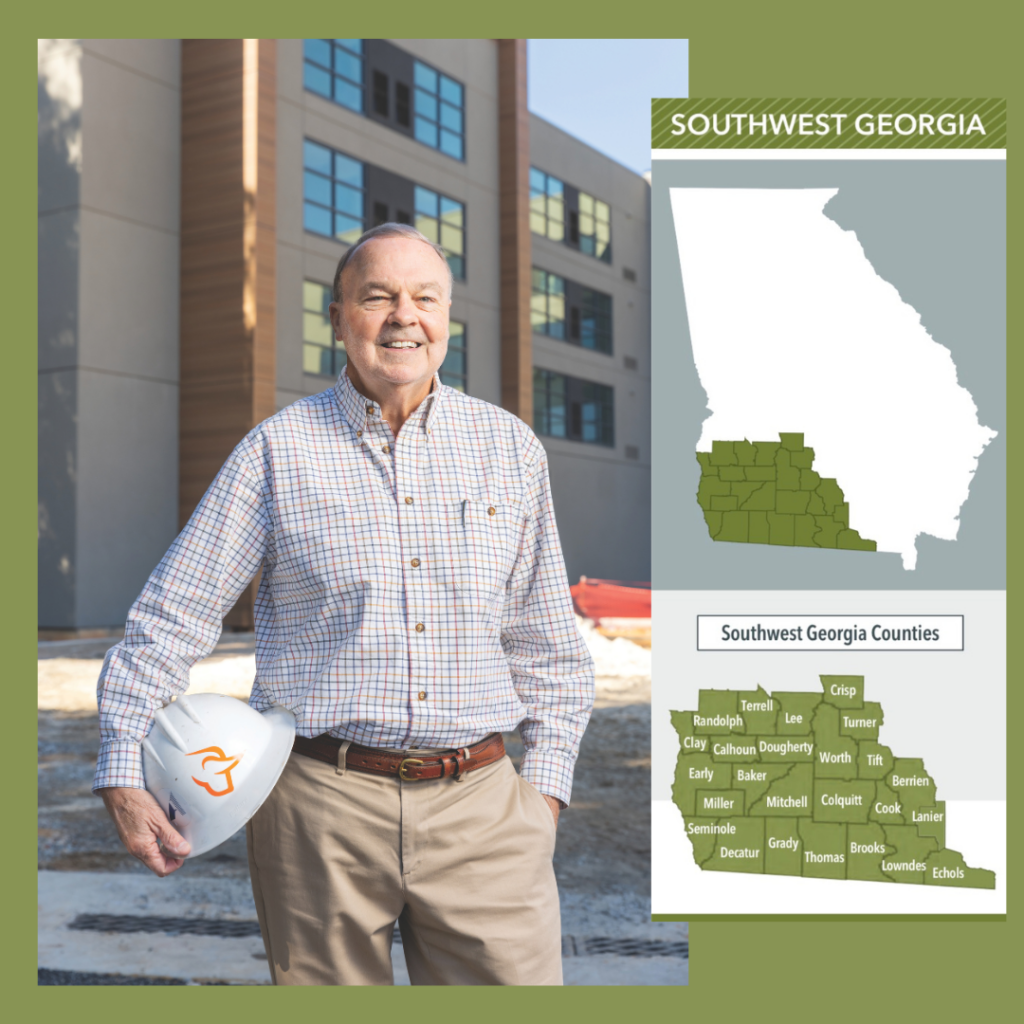Thomasville | Thomas County: Blending Old and New
Tourism, Smart Growth, Workforce Development
When people think of Thomasville, they often think of the city’s charming downtown district that features boutique shops, locally owned restaurants, brick-paved streets and historic buildings. It’s the main reason why people keep flocking to this small city nestled within the beautiful Red Hills region of Southwest Georgia.

Charming and Welcoming: Andrew Goodwin, director of economic development for Thomasville, in the downtown area. Photo credit: contributed
“We are a tourism city,” says Andrew Goodwin, director of economic development for the city. “People come to Thomasville for something different, something unique. That mom-and-pop experience is really what sells Thomasville.”
Downtown Thomasville also hosts two popular events each year: the Victorian Christmas event, now in its 38th year, and the Rose Show and Festival, which can attract some 30,000 people and has been a Southwest Georgia tradition since 1922.
While traditions abound in Thomasville, there are changes happening in this carefully preserved city to make it more livable and enjoyable.
“We are expanding some sidewalks throughout the city, which is great because there are a lot of heavily traveled areas that had no sidewalks,” says Goodwin. “We still have a lot of foot traffic [of people who] walk to work.”
Another change is residential growth. According to Goodwin, the city has over 1,300 active residential permits, which include houses, apartments and condos at different price points.
Additionally, the city recently loosened some downtown code restrictions to spur more housing development. “For years, one of the issues with downtown development was every home required two parking spaces,” Goodwin says. “That became the biggest hurdle to developing any second-floor living or any sort of living in the downtown district.” Now, the city no longer requires parking for new residential spots in the heart of the downtown district.

Unique Visitor Experiences: Chris White, city manager, at the Courtyard by Marriott Thomasville Downtown. Photo credit: contributed
There is also a relatively new Courtyard by Marriott Hotel adjacent to the downtown district. The city purchased the property in 2013 and transferred it to the Thomasville’s Payroll Development Authority in 2018. The hotel opened its doors in March 2021.
“We helped design the ambiance of that hotel that’s specific to Thomasville,” says Chris White, city manager of Thomasville. “It’s not just a Marriott that you would see off the interstate. It’s almost like a boutique experience. It’s really anchored into our downtown. It’s probably one of the best decisions we’ve made in a long time.”
Pursuing Smart Growth
Another important economic driver for Thomasville, according to White, is the quail hunting season that runs from November through February. The city is surrounded by approximately 70 privately owned hunting plantations, home to some of the finest and most exclusive quail hunting experiences in the country. These properties, which are in Thomas County and other surrounding counties, are tied up in conservation easements, so they can never be developed.
In the month of November, “we might have $300 million of private aircraft out there at the airport for people flying in [and] doing personal quail hunting experiences,” says White. Those same visitors come into the town of Thomasville to shop and eat.
While the hunting plantations have been a part of the Thomasville economy for over a century and provide a unique visiting experience for sportsmen and a built-in economic benefit for the area, there is a drawback.
“We are fairly landlocked with all these plantation properties,” White says. “It kind of limits your growth.”
Thomasville Mayor Todd Mobley sees the bright side of this.
“We are fortunate, or maybe unfortunate, that we are landlocked. We can kind of pick and choose what we want to come,” he says. That has led city and county leaders to pursue a strategy of smart growth, challenging them to be very intentional about the kinds of companies they recruit.
“We really need to be smart with the land we have left,” says Shelley Zorn, director of the Thomasville Payroll Development Authority. “We want those high-paying, high-skilled jobs. It’s America, and anyone can open up any business they want, but for us to incentivize, we want it to reach a certain level. We want it to be skilled jobs.”
For example, Troy Acoustics Corporation is scheduled to break ground in early 2025 on a new manufacturing facility at Thomasville’s Red Hills Business Park. The Brunswick-based company engineers sound-wall systems used in highway noise barriers, broadcasting and film production facilities, animal shelters and shooting ranges. It is investing $60 million in Thomasville and will create approximately 165 jobs. The new facility will likely open in 2026.

Creating Jobs: Ashley Furniture invested $20 million to build a new distribution center in the Red Hills Business Park. Photo credit: contributed
In 2022, Spanish-based Ecrimesa, which produces metal injection molded parts, announced that it had chosen Thomasville for its U.S.-based headquarters. Mimecri USA is now open and fully equipped to manufacture small gun parts, like triggers, in the Thomasville facility. It is investing $7 million and will create at least 30 jobs over time.
Check-Mate Industries, opened up a Check-Mate Magazines facility in 2019 and has invested $25 million and created 150 jobs, so far. Zorn estimates that number will eventually reach about 230. The company makes magazines for pistols and rifles. Overall, since the pandemic, new industries have invested more than $212 million in Thomasville and Thomas County and created 1,135 jobs.

Highly Skilled: Shelley Zorn, director of the Thomasville Payroll Development Authority at Check-Mate Industries. Photo credit: contributed
“There are more investment dollars than jobs,” Zorn notes. “People are investing more in building and equipment and AI. Less jobs, but the jobs are higher skilled.”
Existing companies are also expanding. In 2023 alone, according to Zorn, existing companies committed $41 million in new investment and created 314 new jobs. The biggest expansion has come from Ashley Furniture distribution center. The company invested $20 million to build a brand-new building in the Red Hills Business Park, creating at least 100 jobs. Thomasville has been successful in attracting these companies to the area, in part, because it’s a family-oriented community.
“I think we have a niche,” Zorn says. “South Georgia and Thomasville [are] very suited [to] family-owned businesses. For that family-owned business that wants to live where they work, and they care about that and the quality of life, they care about the school system, they want to get involved in the community – that’s us. We haven’t really needed to market ourselves that way. It just happened naturally. When they see Thomasville, it sells itself.”
Building a Workforce Pipeline
Despite all the business development, there are still gaps in the workforce. For years, there has been chatter among business owners concerning the workforce pipeline, and the COVID-19 pandemic only exacerbated the problem.

Communication and Relationships: Andrea Collins, executive director of the Thomasville-Thomas County Chamber of Commerce. Photo credit: contributed
“Every business we talked to, when we would ask them what is the one thing that keeps you up at night, it was workforce,” says Andrea Collins, executive director of the Thomasville-Thomas County Chamber of Commerce. The lack of available workers has prevented businesses from meeting quotas and made it difficult to hire people who were willing to show up.
In 2022, the Chamber of Commerce received a grant from the Williams Family Foundation of Georgia, located in Thomasville, to bring in the Georgia Partnership for Excellence in Education to do a post-COVID assessment of the community.
Collins says the project leader spent an entire year in Thomasville, facilitating focus groups and meeting with individual stakeholders. After that year, she provided a presentation of her findings to the community, identifying five areas of focus that she labeled “pinch points” that were disrupting Thomasville’s birth-to-work pipeline.
One involved communication and relationships. “This is probably the most challenging one,” says Collins. “If you can’t communicate, then the other pinch points are going to be more difficult to work through.”
The study showed there were perceived divides between city and county government, the area’s two school systems, Thomasville natives and transplants, and groups separated along socioeconomic and racial lines. “Racial reconciliation is really at the forefront,” says Collins. “There is definitely a need to work through those things and talk about them.”

Identifying Goals: Thomasville’s School-2-Business Summit connected business owners with educators to match curriculum to career opportunities. Photo credit: contributed
Another pinch point was early education and childcare. When looking at childcare, county leaders employed the Quality-Rated system, which Georgia uses to rate childcare providers based on whether they have well-trained teachers, a safe, healthy environment, low student-teacher ratio and more. For every five kids in Thomas County, Collins says only one had a Quality-Rated childcare slot. “That’s a lot of parents that don’t have childcare that could go into the workforce, or having to stay home because of that,” Collins says.
Literacy by third-grade was a third area of focus. Literacy rates in Thomasville and Thomas County were staggeringly low. School data showed one of the city schools had a less than 2% proficiency level at third grade. “That third-grade literacy rate is very critical,” Collins says. “That is how many people can forecast dropout rates, prison beds, and all sorts of things. If they cannot read by third grade, then they are most likely not going to be able to make it into our workforce pipeline.”
A fourth pinch point was pathways to post-secondary study. Census figures showed only 24% of adults in Thomas County have a bachelor’s degree or higher. “Without a credential, it’s hard to get a job that will support your family,” she says.
The final pinch point was worker barriers to employment, which include shortages in affordable and workforce housing, lack of reliable transportation and mental health needs.
In 2023, committees consisting of community stakeholders and organizations were formed to identify goals and strategies around each of the pinch points. Collins says the chamber hired a local workforce consultant and an independent project manager to manage the workforce plan, facilitate committee meetings and help identify strategies for achieving the goals.
The actual work of implementing the plan is being done by a variety of community agencies and organizations, working together to address these issues.
Early Success

Eat, Drink and Be Merry: Thomasville’s Center for the Arts started a program called “A Seat at the Table,” where people from all walks of life share a meal and get to know each other. Photo credit: contributed
Thomasville is already seeing some progress and success. For example, Collins says the Leadership Thomasville program, with a yearly cohort of 20 community leaders, now has a section built into the program about communicating through conflict. These leaders, along with city and county government officials, were invited to participate in a simulation called StarPower, which is an interactive game focused on bridging differences and which helps them understand the pitfalls of wielding power. The game allows participants to have an “aha moment” and gain insight into other peoples’ perspectives.
“This is one sustainable method that we will be doing with our leadership program and our city and county officials,” Collins says.
In addition, Thomasville’s Center for the Arts has started a program called “A Seat at the Table,” where people from all walks of life come together to share a meal and get to know each other. Facilitators guide the conversations to help create meaningful encounters and build relationships. This was key after the isolation that the pandemic created.
The availability of reliable childcare is also vital for attracting and retaining workers, and Thomasville recently got a little help in this area. The Georgia Department of Early Care and Learning awarded the Thomasville Payroll Development Authority an EXPAND grant (Expanding Parents’ Access to Nontraditional Delivery) for $750,000. Such grants are centered around childcare needs during nontraditional work hours. That is particularly important for the hospital and hospitality industries, which have difficulty finding staff for evening, weekend and night shifts. Through this grant so far, Collins says Thomasville now has three in-home Quality-Rated childcare providers, who have provided 9,000 hours of nontraditional-hour care to support these workers.

Training Ground: Dr. Amy Maison, vice president for institutional advancement at Southern Regional Technical College. Photo credit: contributed
For the pathways to post-secondary study pinch point, one success story has been the creation of a precision machining and manufacturing lab at Southern Regional Technical College’s main campus in Thomasville. The college received a $499,000 grant from Georgia Tech’s Georgia Artificial Intelligence in Manufacturing (GA-AIM) program to build the lab. The 8,000-square-foot lab, which will open in January, will feature equipment used by industries in Thomasville, including two computer numerical control (CNC) machines and robotics. Students will learn how to use and maintain the equipment, so they can seamlessly enter the local workforce.
The college also now has two associate degree programs, Manufacturing Engineering Technology and Precision Machining and Manufacturing, which will give students hands-on training in the lab.
“What this facility will do is train individuals in several different areas of manufacturing and precision machining so they can then go into our local manufacturing companies,” says Amy Maison, vice president for institutional advancement at Southern Regional Technical College. “All those industries are in desperate need of this type of workforce. So, we created these programs in response to those needs.”
These early successes are a great step forward in meeting the workforce needs of the community, but there is still much work to be done. “One thing we’ve realized is that this work is not ever finished,” Collins says. “It is truly a lifetime’s worth of work.”

Hands-on Learning: Mason Miller, vice president for Academic Affairs at Southern Regional Technical College, was the tour guide at the School-2-Business Summit tour of the school’s new precision manufacturing and machining lab. Photo credit: contributed
Local Flavor
Preserving Black History
As a Black man born in 1936, historian James “Jack” Hadley lived through the Jim Crow era and is now on a mission to preserve a Black-frendly landmark. Thomasville’s Imperial Hotel was listed in The Negro Motorist’s Green Book, and later The Negro Traveler’s Green Book, the annual travel guide published from 1936-1967 that featured hotels, restaurants and other places that welcomed Black travelers when segregation was widespread. The Imperial was the only hotel of its kind in the area. The building is in a state of deterioration and neglect, and Hadley is leading an effort to raise money to preserve this piece of Thomasville and Black history.
“It’s going to be an amazing addition to Thomasville, not just to Black history, but it’s going to be an economic driver,” says Andrew Goodwin, Thomasville’s economic development director and a board member of the Jack Hadley Black History Museum. “Thomasville is a wonderful town and has so many great amenities here, but that’s a game changer for us.” Owned by Harvey and Dorothy Lewis Thompson, the Imperial Hotel was built in 1949 by Dorothy’s five brothers and featured eight guestrooms, communal baths, a barbershop and a restaurant. The Thompsons operated the hotel until 1969 when it closed. Afterward, it changed owners several times and briefly served as headquarters for a chapter of the NAACP. It has been vacant since 2001.
Enter Hadley, an Air Force veteran, retired postal worker and founder of the museum, which in 1995 was the first African American history museum in South Georgia. Four years ago, the museum secured grants from Thomasville Landmarks, a nonprofit historic preservation organization; The Thomas M. & Irene B. Kirbo Charitable Foundation; and the Williams Family Foundation of Georgia to purchase the Imperial Hotel with the intent to preserve and restore it. Hadley plans to make the top floor Airbnb space and use the bottom floor for a rotating exhibit.
The Imperial will be part of a broader campus focused on Black history, called the Jack Hadley Yards. It’ll include an original shotgun house, built in 1907, similar to the kinds of homes that Black families rented for many years. An adjacent vacant lot will become the new home of the museum, a state-of-the-art facility that Hadley has designed to feature his collection of some 5,000 items, including old news clippings, prints, books, pictures, magazines, paintings and posters. The museum is currently in the middle of a $15 million campaign to build the new structure and preserve the hotel.
“It will let the public know that Thomasville has a serious interest in preserving African American history and culture,” says Hadley. “When we know the [school groups] are coming, then we can educate our young people, and that’s the most important part. That’s why I’m hanging in there at the age of 88.” 







